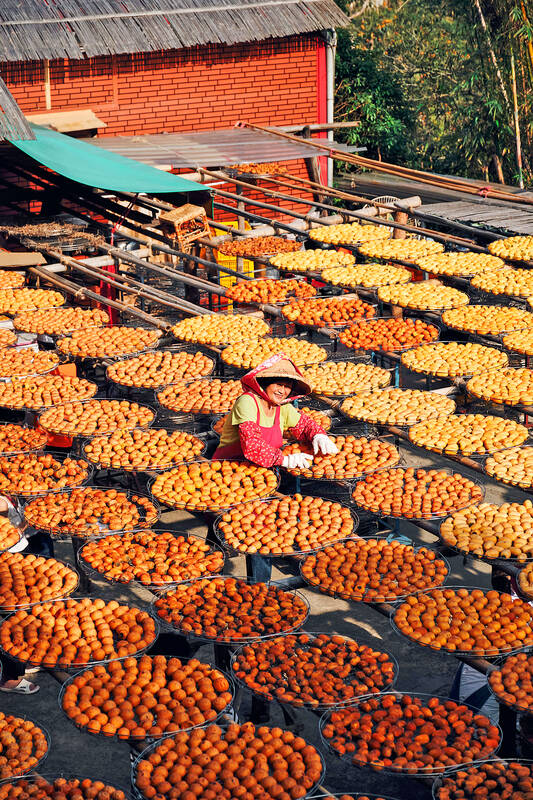對話 Dialogue
小清:今天天氣好舒服,真是秋高氣爽!
Xiǎo qīng: Jīntiān tiānqì hǎo shūfú, zhēnshi qiūgāoqìshuǎng!

Photo courtesy of Unsplash / 照片:Unsplash 提供
小華:是啊!我們應該去郊外走走。
Xiǎo huá: Shì a! Wǒmen yīnggāi qù jiāowài zǒu zǒu.
小清:最近是柿子的產季,我們一起去新埔看看曬柿子的風景吧!
Xiǎo qīng: Zuìjìn shì shìzi de chǎnjì, wǒmen yīqǐ qù xīn bù kàn kàn shài shìzi de fēngjǐng ba!
小華:好啊!我上次看到朋友拍的照片好漂亮,而且聽說還可以體驗怎麼做柿餅。
Xiǎo huá: Hǎo a! Wǒ shàng cì kàn dào péngyǒu pāi de zhàopiàn hǎo piàoliang, érqiě tīng shuō hái kěyǐ tǐyàn zěnme zuò shìbǐng.
小清:我很喜歡吃柿餅,也喜歡買柿餅送人,因為柿子代表事事如意。
Xiǎo qīng: Wǒ hěn xǐhuān chī shìbǐng, yě xǐhuān mǎi shìbǐng sòng rén, yīnwèi shì zǐ dàibiǎo shìshì rúyì.
小華:為什麼呢?
Xiǎo huá: Wèishéme ne?
小清:因為「柿子」的「柿」跟「事情」的「事」發音一樣啊!中文喜歡用這種諧音的方式來說吉祥話。
Xiǎo qīng: Yīnwèi `shìzi’de `shì’gēn `shìqíng’de `shì’fāyīn yīyàng a! Zhōngwén xǐhuān yòng zhè zhǒng xiéyīn de fāngshì lái shuō jíxiáng huà.
小華:我知道!我們課本上還說吃魚就代表年年有餘。
Xiǎo huá: Wǒ zhīdào! Wǒmen kèběn shàng hái shuō chī yú jiù dàibiǎo nián nián yǒuyú.
小清:對了!你真能舉一反三!
Xiǎo qīng: Duìle! Nǐ zhēnnéng jǔyīfǎnsān!
翻譯 Translation
Xiaoqing: The weather is so nice and pleasant today. It’s truly a refreshing fall day.
Xiaohua: Yeah, we should go for a walk in the countryside.
Xiaoqing: It’s persimmon season right now. Let’s go to Xinpu together and take a look at the persimmons drying in the sun!
Xiaohua: Sure! I saw some beautiful photos taken by my friend last time, and I heard you can also experience making dried persimmons there.
Xiaoqing: I really enjoy eating dried persimmons, and I like giving them as gifts too, because persimmons symbolize everything going the way you want.
Xiaohua: Why is that?
Xiaoqing: Because the pronunciation of “柿” (shi) in “柿子” (shizi) is the same as the pronunciation of “事” (shi) in “事情” (shiqing) which means “things” or “matters.” Chinese often use this kind of homophonic wordplay to express good wishes.
Xiaohua: I know! Our textbook also mentioned that eating fish symbolizes abundance year in, year out.
Xiaoqing: Right! You’re really good at deducing things from examples!
生詞 Vocabulary
1. 柿子 (shìzi) persimmon
2. 柿餅 (shìbǐng) dried persimmon
3. 秋高氣爽 (qiūgāoqìshuǎng) refreshing fall weather
4. 產季 (chǎnjì) (harvest) season
5. 體驗 (tǐyàn) experience
6. 代表 (dàibiǎo) symbolize
7. 事事如意 (shìshì rúyì) everything goes as you wish
8. 諧音 (xiéyīn) homophonic
9. 吉祥話 (jíxiáng huà) auspicious words
10. 年年有餘 (nián nián yǒuyú) have abundance year after year
11. 舉一反三 (jǔyīfǎnsān) deduction from examples
國立清華大學華語中心提供
By National Tsing Hua University Chinese Language Center:

A: When is the Lantern Festival? B: The festival is celebrated on the 15th day of the first month of the lunar calendar, which fell on Feb. 12 this year. A: Oh no! Did I miss the 2025 Taipei Lantern Festival? B: Yes, you did. But you can still go to the 2025 Taiwan Lantern Festival in Taoyuan, which will run until this Sunday. A: Let’s go admire the exuberant lanterns. A: 元宵節到底是哪一天? B: 就是農曆1月15日啊,今年則落在國曆2月12日。 A: 喔不,我是不是錯過了2025台北燈節? B: 是的,但你還可以去桃園的2025台灣燈會,活動將持續至週日。 A: 那我們去欣賞豐富的花燈秀吧! (By Eddy Chang, Taipei Times/台北時報張聖恩)

A: What’s the theme of the 2025 Taiwan Lantern Festival’s main lantern? B: The theme is “Paradise,” and the main lantern is a snake-shaped “infinity” symbol that features a lighting show every half an hour. A: Cool, I heard that there are over 300 lanterns. B: There are even giant lanterns in the shape of Pikachu and some other popular Pokemon characters. A: Let’s go now. A: 2025台灣燈會主燈的主題是什麼? B: 主題是「無限樂園」!主燈的造型則是蛇形的數學「無限號」,主燈每半小時還有一次燈光秀。 A: 酷喔,聽說總共有300多件花燈作品。 B: 甚至還有皮卡丘和其他熱門寶可夢角色的巨型花燈呢。 A: 哇我們現在就出發吧! (By Eddy Chang, Taipei Times/台北時報張聖恩)

本文由生成式AI協作,本刊編輯編修。 Tucked away in southwestern Taiwan, Yunlin County is a treasure trove of cultural heritage, rich history, and natural beauty. From its stunning temples and glove puppetry to historical architecture and picturesque landscapes, Yunlin rewards those who venture off the beaten path. Yunlin is renowned for its flourishing temple culture. Temples in this region are not merely places of worship but also communal centers where people gather for festivals, rituals, and social functions. One of the most notable temples here is the Beigang Chaotian Temple, which was built more than 300 years ago and is dedicated to Matsu, the sea

Nestled within the heart of Taipei, National Taiwan University (NTU) contains a grand and spacious sanctuary where nature and academia come together in perfect accord. Across its expansive 111-hectare campus, NTU reveals a landscape rich with history, lush greenery, and a thoughtfully preserved ecosystem. This tranquil haven invites visitors to take their time wandering among the elegant buildings, to admire the rare plants, and to experience a space that exudes quiet inspiration. Zhoushan Road: A Gentle Prelude to NTU’s Tranquility Beginning at Gongguan MRT Station, the enchanting avenue Zhoushan Road leads visitors into NTU shaded by golden rain trees, cottonwoods, and Javanese